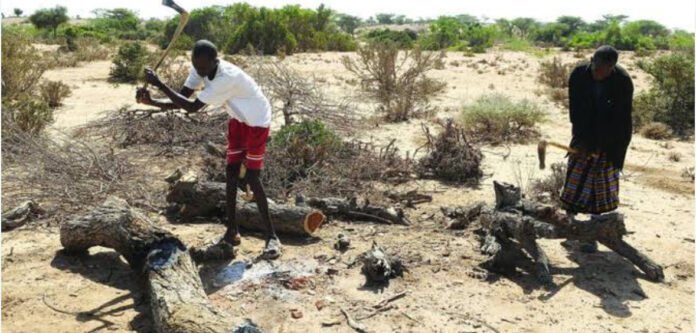Sunday, June 22, 2025 –(HAN)
Mogadishu: A study conducted by Horn Africa News has revealed that cutting trees has had a severe impact on the Somali environment, especially since the collapse of the central government in 1991. The effects are deeply felt across ecosystems and communities. Here are the main consequences:
- Deforestation and Loss of Vegetation
• Large-scale tree cutting—especially for charcoal production—has stripped the land of natural vegetation.
• Forests and bushes that once protected the soil and supported biodiversity are rapidly disappearing.
• Without trees, soil erosion becomes widespread, particularly during heavy rains and strong winds. - Soil Degradation and Desertification • Trees help protect topsoil by anchoring it with their roots. When removed, the soil becomes loose and vulnerable to erosion.
• This leads to desertification—turning once fertile land into unproductive desert.
• As a result, large areas of Somalia are now dry, barren, and unsuitable for farming or livestock. - Climate Change and Drought • Trees play a key role in regulating climate and attracting rainfall through transpiration (release of water vapor).
• With fewer trees, rainfall patterns shift, and droughts become more frequent and severe.
• These changes have disastrous effects on agriculture, livestock, and water resources—putting millions of lives at risk. - Loss of Livelihoods and Rising Conflict • Many Somali communities depend on the land for farming and pastoralism.
• When trees are cut and the land becomes infertile, farmers lose crops, and pastoralists lose grazing grounds.
• Resource scarcity can spark conflicts between clans and communities over access to land and water. - Air Pollution and Health Hazards • Charcoal production and use release large amounts of smoke and carbon emissions, contributing to air pollution and climate change.
• People living near charcoal kilns or cooking indoors with charcoal often suffer from respiratory diseases due to prolonged smoke exposure. - Biodiversity Loss • Trees provide shelter and food for birds, insects, and small animals.
• Deforestation destroys these habitats, pushing many species toward extinction.
• This threatens the delicate balance of the ecosystem.
What Can Be Done?
• Launch reforestation and tree-planting campaigns.
• Enforce laws against illegal logging and charcoal exports.
• Promote clean energy alternatives such as solar, biogas, or liquefied gas to reduce reliance on charcoal.
• Organize community awareness programs on the importance of environmental conservation.





